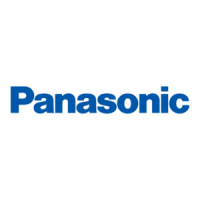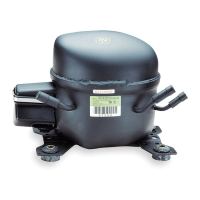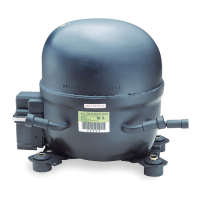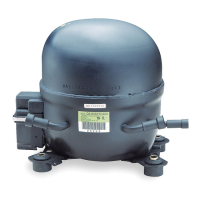Do you have a question about the Panasonic SCROLL C-SB Series and is the answer not in the manual?
Identifies and describes the main parts of the scroll compressor.
Details the construction and components of the C-SB series scroll compressor.
Details the construction and components of the C-SC series scroll compressor.
Explains the three-step compression process and its benefits.
Presents design pressure values for different refrigerants.
Discusses the type and function of refrigerant oil used.
Lists oil models and types for different refrigerants.
Outlines the key functions of refrigerant oil in the compressor.
Details the types of motors used with the compressors.
Specifies design criteria for air-conditioning systems.
Recommends condensing and evaporating pressures based on JIS standard.
Explains the importance of sub-cooling for capacity and efficiency.
Details minimum superheating requirements for compressor protection.
States the recommended maximum discharge gas temperature.
Explains the function and requirements for suction accumulators.
Specifies the required ratio of oil to refrigerant for system longevity.
Guides on selecting appropriate electrical wiring sizes.
Explains voltage drop and its impact on compressor starting.
Explains the importance of voltage balance for motor winding health.
Details the function of the internal motor protector and its reset mechanism.
Lists essential protective devices for AC or heat pump units.
Explains the need for reverse phase protection in three-phase systems.
Describes the discharge gas thermostat for preventing overheating.
Specifies low-pressure switch settings for refrigerant loss detection.
Recommends crankcase heaters for preventing oil dilution during off-cycles.
Specifies high-pressure switch settings for overload conditions.
Defines standard and limit operating conditions for compressor application.
Provides a table for gathering information to select a compressor.
Offers a table to record system test results for performance evaluation.
Outlines temperature conditions for maximum operating performance tests.
Details temperature conditions for low-temperature operation tests.
Provides a table for recording start performance and voltage drop tests.
Section for recording information about tested compressor samples.
Instructions for safely removing shipping rubber plugs from the compressor.
Guidance on mounting the compressor using specified accessories.
Specifies maximum allowable residual moisture levels in the system.
Emphasizes cleanliness and proper procedures for brazing system piping.
Recommends specific silver and copper-phosphorus brazing materials.
Details the procedure for nitrogen purging during brazing.
Step-by-step guide for performing brazing operations.
Outlines the procedure for conducting system leakage tests.
Details the process of evacuating the system to remove moisture and gases.
Provides guidance on the proper method for charging refrigerant.
Explains how to make correct wiring connections for the compressor.
Instructions for installing the terminal cover and clip correctly.
Steps to perform before and during the initial compressor run.
Recommends starting the compressor with balanced system pressure.
Introduces procedures for servicing the scroll compressors.
Procedures to verify the compressor is functioning correctly.
Emphasizes proper system evacuation during field service.
Guides on safely removing a failed compressor from the system.
Details brazing procedures for field servicing operations.
Steps for replacing a compressor after a motor burn-out.
Instructions for sealing and documenting returned failed compressors.
Lists miscellaneous considerations for installation and handling.
Lists probable causes for compressor failure to start.
Lists probable causes for premature compressor shutdown.
Lists probable causes for abnormal running noise.
Lists probable causes for reduced cooling performance.
Lists probable causes for compressor frosting or dew formation.
Lists probable causes for unpleasant smells related to the compressor.
Explains issues related to refrigerant oil and liquid refrigerant mixture.
Explains compressor behavior during refrigerant reclaiming.
Clarifies the limitations of reverse phase protectors.
Explains why compressors might temporarily halt due to protector trips.
Informs about the reset time for the internal motor protector.
Provides important notices for field applications regarding protector trips.
| Brand | Panasonic |
|---|---|
| Model | SCROLL C-SB Series |
| Category | Air Compressor |
| Language | English |











